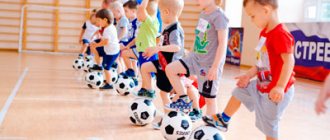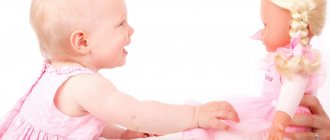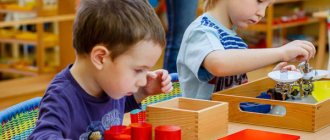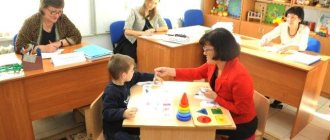Distance learning for teachers.
Upon completion of the courses, certificates and diplomas are issued.
More details on the page
" Retraining and advanced training of teachers ."
Our phone number is 8-800-775-09-71 Free call within Russia!
Kindergarten is a serious challenge in a child’s life, a big test for a child. Any test makes a person stronger, moves him forward in development or, on the contrary, throws him back. Therefore, today the topic of organizing the pedagogical process during the period of adaptation of young children to the conditions of a preschool educational institution is relevant. Adaptation is considered as the body’s adaptation to a new environment, which includes a wide range of individual reactions depending on the psychological and personal characteristics of the child, the specific nature of family relationships and upbringing, and the conditions of being in the garden. Much in his behavior depends on how adults approach the baby during the adaptation period, how they can organize his life in a group.
A child’s admission to kindergarten is a special period of life for the whole family: both for the child and for the parents. For a baby, this is a strong stressful experience that needs to be mitigated. He will have to adapt to completely different conditions than those to which he is accustomed in his family. A clear daily routine, the absence of parents, as a rule, a different style of communication, the need to communicate with peers, a new room - all these changes create a stressful situation for the child. These new factors cause a defensive reaction in the baby in the form of crying, refusal to eat, sleep, and communicate with others.
Both teachers and parents must understand how important the moment of a child’s adaptation to the conditions of kindergarten is and how serious consequences it can provoke for the child’s health.
There are three degrees of adaptation of young children to kindergarten conditions - mild, moderate and severe.
This gradation is based on the following indicators:
- The speed of normalization of the child’s emotional well-being;
- Demonstrating a positive attitude towards teachers and peers;
- Having an interest in the subject world;
- Frequency and duration of acute viral diseases.
Easy adaptation takes place within 1-2 weeks. The child’s experiences are observed for no more than 14 days.
The baby quickly begins to show interest in others:
- Caregivers and children experience minor disturbances in sleep and appetite.
- The child is not sick, by the end of the second week he can easily separate from his parents, and his emotional state is normalized.
With moderate adaptation, children experience significant disturbances in sleep and appetite, which return to normal by the end of the month. The baby is usually passive, capricious, irritable, often cries, he is not interested in toys, and he stops using an active vocabulary. Disturbances in the functioning of the autonomic nervous system often occur - this is expressed in the appearance of pale skin, sweating, shadows appear under the eyes, and changes in stool are recorded. The child is susceptible to infectious diseases that are severe. Typically, the described symptoms begin to subside a month after the first visit to kindergarten.
The most dangerous for a child’s health is a severe degree of adaptation to a preschool institution. A child who finds it difficult to get used to kindergarten is usually susceptible to long-term and serious illnesses. The baby’s immune system cannot cope with infections, and they begin to replace one another. He is emotionally exhausted, capricious, and neurotic states are often observed. Parents and teachers are concerned about the baby's appetite - he refuses to eat, and attempts to feed him may end in vomiting. Sleep is disturbed, the child sleeps very lightly, often wakes up, cries in his sleep, and cannot fall asleep for a long time. The baby is not happy with the environment. He refuses to play with his favorite toys, hardly communicates with other children, and is passive in communication with adults. Depending on individual typological characteristics (type of higher nervous activity, type of temperament), a child can be either quiet and depressed, or, on the contrary, aggressive and hysterical. This condition can be observed for several months, while all the vital forces of the baby are suppressed, and the pace of physical and mental development slows down.
The peculiarity of a child’s adaptation to new conditions is due to the specific characteristics of an early age. This period is the most crucial period of a person’s life, when the baby’s basic skills are formed, so necessary for his successful development. At this time, such dominant qualities as cognitive activity, independence, initiative, sociability, trust in the world, self-confidence, a friendly attitude towards people, and creative potential develop. But their formation requires adequate actions on the part of adults, certain forms of communication and active interaction with the child.
The main lines of development of young children are:
- development of subject activity;
- development of emotionally effective communication with adults.
The leading role of objective activity in the development of a child is obvious. Inclusion in objective activities allows the child to develop culturally normative, specific and instrumental actions. Use surrounding objects in your daily activities (eating with a spoon, digging with a spatula, using a comb, etc.) in accordance with their social purpose.
In early childhood, there is an intensive development of visual-effective thinking and cognitive activity, the formation of purposefulness and perseverance of the child’s actions. Constructive games and toys are used to develop actions.
A special feature of early childhood is the specific mode of life of the baby. As a rule, the child spends this important period of his development in the family. A family environment is optimal for a child - the love of close adults, their sensitive and flexible attitude, individual communication are a necessary condition for his normal development and good emotional well-being. In modern conditions, families are often forced to interrupt the harmony of the child’s development at home and use the services of a kindergarten.
The main task that kindergarten workers and parents solve at this time is to make kindergarten desirable for the child. It is necessary that separation from home, from loved ones, meeting new adults, unfamiliar peers does not become a serious psychological trauma for the child.
The adaptation period is considered complete if the child eats with appetite, falls asleep quickly and wakes up on time in a cheerful mood, plays alone or with peers.
Main features of the normal current period of adaptation
Mood disorders
Tearfulness, moodiness, depression in some children; excitability, anger, aggressive manifestations in others (duration - from a week to 1.5 months).
Sleep disorders
Children very often begin to sleep worse, have difficulty falling asleep in the evening, and may cry before going to bed; in the morning it can be very difficult to wake them up at the right time. Some children cannot fall asleep during the day in kindergarten, become overtired and quickly fall asleep in the evening. Others, overexcited, cannot calm down until 22-23 hours. Lack of sleep affects the well-being of children almost immediately and has a complex negative effect on the nervous system (duration - from 1 to 2 months).
Appetite disorders
Children begin to eat poorly (both at home and in the garden) for the reason that they are offered unusual food, new dishes that taste unfamiliar. For children who are accustomed to eating pureed food at home, the consistency of the dishes in kindergarten may be unexpected. In combination with the increased nervous excitability of some children, this can lead to short-term gastrointestinal disorders - vomiting, abdominal pain, hiccups, and sometimes food allergies (duration - from 1 week to 1 month).
Decreased immunity
Due to stress, the immune system of young children suffers, they begin to get sick often (usually ARVI), react to hypothermia, overheating, and drafts much more often than in the normal state; easily become infected from each other (duration - from 2 to 10 months, for some even longer).
Behavior disorder
Children seem to return to earlier stages of development, play worse, games become more primitive, cannot tear themselves away from their mother even at home, and begin to be afraid of strangers. Some experience a loss of self-care skills, hygiene skills (they do not ask to go to the potty, have difficulty washing their hands, etc.) (duration - from 1 week to 2 months).
Recommendations for the adaptation of children in kindergarten
Most children begin attending child care at the age of 2.5-3 years. For some of them, the transition from a home environment, familiar and favorite toys, and close adults is more or less easy, and after 2-3 months they get used to kindergarten. For others, it turns into a tragedy, fraught with behavioral disorders, a sharp deterioration in health, constant dysphoria (low emotional background, bad mood), and in the future even early neuroticism, leading to the appearance of multiple psychological and neurological disorders.
At the age of 2-3 years, a child is not able to play with toys, even very attractive ones; he still does not know how to communicate with other children, does not understand them and cannot express his desires, thoughts, feelings so that he is understood. Some children may simply be afraid of strangers.
For any teacher, the period when many newcomers come to the group is a great challenge. It is especially important at this time to lay the foundations of favorable relationships between children in the group and to create the prerequisites for emotional comfort for each child. All further tasks related, for example, to learning, self-care, etc., are secondary, since their implementation may be possible a little later, when the children calm down and make contact.
Working with parents of children entering kindergarten should begin long before they bring their child. Even when enrolling a child in an institution, the mother should receive clear information about the adaptation period and what she personally can do to make this period as easy as possible for the child. Parents and educators should be aware of the specifics of the adaptation period, its stressful effect on the child, its duration (1.5-3 months), and possible violations.
Physical development
At an early age, a baby's weight is about a fifth of that of an adult, but much depends on the child's genetic predisposition and physical activity. And its activity is growing every year. As soon as a child begins to walk, new opportunities open up for him to explore surrounding objects, but this is a period of increased risk of injury, so parents should be very careful. It is recommended to remove all heavy, sharp, dangerous objects and household chemicals from his field of vision. All sockets must have plugs installed.
The figures of children of early preschool age are very peculiar: the back is arched, the stomach is slightly protruded due to internal organs that continue to grow. In children, folds on the legs and arms disappear, adipose tissue decreases, giving way to muscle tissue. The skeleton has not yet completely ossified, but the bones of the skull and spine have strengthened sufficiently.
Activities of the teacher during the period of children’s adaptation to kindergarten.
The teacher needs to warn parents about the peculiarities of children’s adaptation to new conditions and ask them to be sure to talk about how the child behaves at home. If the baby has been accustomed in advance to the daily routine that awaits him in kindergarten, if he knows how to ask to go to the toilet, is ready for raw and varied food, knows how to play with toys, is interested in them, is capable of at least short-term contact with other children, and is not afraid of them , trusts the teacher, then most of the problems associated with the adaptation period will pass. It will be easy for both parents and teachers.
If the parents have not prepared the child for preschool, if he has certain disorders of the nervous system (perinatal encephalopathy, minimal brain dysfunction, etc.), which, unfortunately, is becoming more common, or suffers from chronic diseases at the stage remission, then his adaptation to kindergarten will be difficult.
The teacher of the group first of all is faced with the fact that children who start attending kindergarten are very different in their skills, level of physical and mental development. In a short time, you have to organize a more or less homogeneous group, where everyone at least understands what is happening around them and what is required of them.
It is known that those children who, firstly, are not afraid of peers and adults, adapt most easily to kindergarten, i.e. accessible to contact, and secondly, they know how to play or at least deal with toys on their own or with other children.
From the first days of a child’s stay in a preschool educational institution, the teacher should try to provide, first of all, psychological and physical comfort for children, to mitigate the difficulties of the transition from a home (different for everyone) to a public (same for everyone) way of life. This determines the opportunity to solve the most noticeable problems that arise in the first month, when babies’ adaptation to new conditions gives them so many unpleasant moments.
To address children of early and early preschool age who have just started going to kindergarten, it is necessary, on the one hand, individually, by name: “Katenka, let’s go wash our hands,” and on the other hand, emphasize the child’s belonging to the group, teach them to respond to the address “ Guys,” etc.: “Guys, now let’s all sit down at the tables!” And you, Katya, sit down, and you, Vitya, right here.” All actions that are unusual for children must be spoken out, explained, repeated many times: “Now we will all get dressed, go to our lockers - this is Misha’s closet, and this is Mashin’s, and this is yours. And you, Sonya, are great, you found your closet yourself.”
If children understand the teacher, it is easy to teach them things that they have not encountered at home or are used to doing differently. It is important to maintain an individual approach - you need to remember who can do what and who has what difficulties.
At the same time, the teacher tries to draw the children’s attention to each other, to ensure that they remember what their names are and, if possible, can address each other and the teacher by name. For this, there are special games aimed at getting to know each other, remembering names, as well as rituals of greeting and farewell to each child: “Here, guys, Helen has arrived. Hello, Lenochka! Let's all say hello to her!..”, “Vitalik went home. Let's say goodbye: bye-bye, Vitalik! Till tomorrow!" In games such as "Tank Engine", children are carriages, and each has its own name. “The first carriage is Sasha, the second carriage is attached to it - Ilyusha, the third carriage is Verochka, and the locomotive today will be Anyuta!”
Constant repetitions help children quickly remember what their names are, and games (under the guidance of a teacher) contribute to the emergence of first contacts, physical and playful.
Much attention should be paid to guiding children's play, showing simple actions with toys, accessible plots, and playing them with different toys. Gradually, the kids begin to repeat them, supplement them, make changes - the first games appear. And a child who is able to occupy himself with toys is in a good mood, does not cry, and more easily comes into contact with other children, first repeating certain actions after them, then communicating outside of play situations.
There are children who find it very difficult to eat and sleep in an unfamiliar environment. It may take several days before the child agrees to remain alone in the group, without his mother. It is good to advise his mother to give him a toy with her (not a new one, but not his favorite one either - in order to avoid conflicts), just so that something familiar remains with him, “a piece of home.” Such a child must be shown the crib in advance, demonstrate how others lie down, promise that the crib will wait for him, and tomorrow he will be able to sleep on it.
Based on the typical difficulties with sleep, appetite, instability of hygienic skills, etc. during the adaptation period, it is important for the teacher and assistant teacher to take into account the age and individual characteristics of the children as much as possible. If a child does not eat well, it is unacceptable to force feed him or even simply insist on “finishing” the entire portion: at this age, neurotic vomiting easily occurs and becomes permanent. If he doesn’t fall asleep, you need to give him a toy, sit with him, calm him down, allow him not to sleep, but just close his eyes and lie quietly. Children with poor hygiene skills should be invited to the toilet more often. They need to be reminded of this during walks. They must have a supply of spare clothes and linen. Usually these problems disappear by the end of the first month of visiting kindergarten, but after a long absence (for example, due to illness) they may reappear for a short time.
If educators and parents together kindly but firmly direct the child’s life in a new direction, there will be no special problems with the child (if he is physically and mentally healthy).
Mental development
The mental development of children of early preschool age is characterized by spasmodic and high rates. The following factors have the greatest influence on the formation of a child’s psyche:
- Ability to walk. Independent movement makes many objects accessible to him, gives him the opportunity to learn to freely navigate space, learn to determine the distance to an object.
- Ability to speak. The child actively begins to master speech, and this period is the most favorable for the development of this skill.
- Subject activity of the child. The baby plays not only with toys, but also with other objects that come into his field of vision, he gradually masters their purpose and learns to transfer the functions of some objects to others, he replaces the things missing for play.
The emotional state is of particular importance for the psyche of a young child. If a child feels comfortable and safe, he is more open to new knowledge about the environment, in addition, he better forms the social connections necessary to communicate with children and adults.
Developmental delay
The pace of development of each baby is individual, but there are certain frameworks and norms, deviation from which may indicate a developmental delay. In most cases, mental retardation at an early age can be successfully eliminated.
Signs of developmental delay in a child at 3 years old:
- Underdevelopment of speech function, that is, an extremely small vocabulary, its complete absence, unformed speech imitation (does not repeat sounds and words after parents or adults), impaired pronunciation, lack of phrasal speech.
- Problems with everyday skills: does not know how to eat, dress independently, does not know how to take care of himself.
- Lack of targeted actions.
- Undeveloped gaming activity: games are monotonous and develop much more slowly than normal.
The presence of one or more of these signs should force parents to contact an experienced specialist to diagnose young children and receive the necessary recommendations to eliminate developmental disorders.
Causes of developmental delay
Child developmental delay is not an independent disease. This is a consequence of various reasons - both congenital and acquired, which affect the child from birth.
So, developmental delay can be caused by:
- Diseases of the mother during pregnancy: infections, injuries, poisoning, and so on.
- Oxygen deficiency in the fetus.
- Complicated, prolonged or rapid labor.
- Injuries that have affected the child's brain.
- Genetic abnormalities that affect the normal development of the child’s brain.
In addition to difficulties and diseases, mental retardation can be a consequence of improper upbringing of the child. According to statistics, this diagnosis is more often given to children from disadvantaged families, but this does not exclude the appearance of developmentally delayed children in ordinary families. Abuse, screaming, and scandals can cause a child to develop at a slower pace.
Groups for early childhood development
For children from one to three years old, special early childhood groups are organized. They are aimed either at comprehensive development, or at the study of one specific area, for example, groups of artistic creativity, language, mathematics. Parents are present at classes with children; classes for young children are conducted in a playful manner in accordance with the methodology.
When choosing a program for a child, it is important that the classes do not overload or tire him. If he is capricious, refuses to study, or tries to run away, then they need to be stopped or replaced with others. It is necessary to take into account the individual characteristics of the child and select activities in accordance with his interests and strengths.
Agree with the child
The peculiarity of young children is that they already understand and realize everything. That is why it is possible to reach an agreement with them, but parents should understand that this does not mean forcing them to do what an adult needs; agreements must take into account the interests of both parties. Successfully reaching an agreement with your child means finding the optimal solution that will suit everyone.
To come to an agreement with a child, you need to learn to listen to him. It is important that the child understands that his condition is understood and all his wishes are taken into account, that he is listened to and heard. If a child comes with a problem, active listening will help him cope with negative feelings.
It is important to provide choices, to create the illusion of choice. Authoritarian orders will be met with hostility. The offer to make a choice will strengthen self-confidence and the understanding that his opinion is taken into account - conflict will not occur, and at the same time, the authority of the parents will not be shaken.
What to do if you have developmental delays
The earlier the correction of developmental delays begins, the better results can be achieved, especially if the cause of the delay is not brain damage, but social factors. To do this, it is necessary to follow the recommendations of specialists and constantly work with the child. Only regular classes and exercises will lead to good results.
The development of fine motor skills of the hands is very important; this will allow you to more accurately perform all kinds of actions with objects, and also activate the centers of the brain that are responsible for speech development.
Finger exercises, massage, and games will help the baby with speech development.
Parents need to regularly use manuals that introduce the baby to the concepts of color, shape, size, and also develop gross and fine motor skills. You can enroll your child in specialized groups or kindergartens.
Early development methods
There are many methods of early childhood development, each based on certain learning principles. The most popular of them:
- Montessori pedagogy. The main principle is the creation of complete freedom in the implementation of the educational process. The methodology also involves the creation of a specific educational environment in which each child finds something to do for himself. The cycle of work with young children lasts 3 hours, and children of different ages can study in the same group. Children do not sit in one place; they can easily move around the classroom. The method provides that during classes special educational materials are present in only one copy (each type) - this teaches the child to interact socially with other children.
- The Doman method is aimed at teaching a child to read and involves the use of certain cards. The technique requires the child to memorize the entire word instead of sequentially learning letters first, then syllables.
- The system of educational games for young children (Nikitin system) is the basic principle of joint play between parents and children. In the course of such activities, children develop, educate and improve their health. Most of these games are rebuses, puzzles that can be solved using logical and imaginative thinking.
The system of educational games contains tasks of completely different difficulty levels, so a small child should be offered something easier and increase the difficulty level gradually as they successfully complete previous tasks.
- Zaitsev’s method is based on the fact that the main activity at an early age is play, for which every child has a need. The most famous aids of this technique are Zaitsev's cubes, which are used to teach reading. The cubes are different in color, size and sound.
- The “7 Dwarves” program is a project designed for children from several months to 7 years old. Each age is represented by a different color. The technique involves the use of manuals for the comprehensive development of the baby; they can be used both at home and for classes in early development groups.








